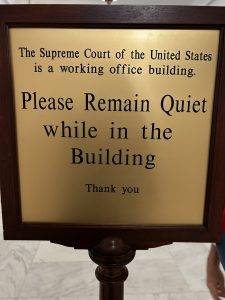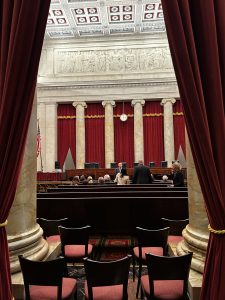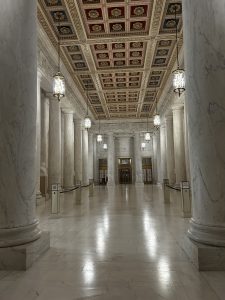I am sitting here in my office at my desk watching the Georgia Supreme Court oral arguments today, October 21, 2025, on my computer. I am able to do this because the Georgia Supreme Court televises live all of its oral arguments, even when it travels around the State of Georgia for special oral arguments. You and anyone in the world can watch oral arguments by going to the Georgia Supreme Court’s website and simply clicking LIVE Oral Arguments. It’s that easy and that simple. And that’s exactly as it should be.
The live feed of the Georgia Supreme Court focuses on each speaker, whether it is the attorney or the Justice and identifies each Justice as they ask questions. In this way, the public knows which Justice is speaking, and can see for itself how seriously the Court takes every matter before it. And how seriously every lawyer takes being before the Court. If any citizen of Georgia ever had any doubt about how the Georgia Supreme Court operates and how seriously it takes its oath to do Justice and uphold the Georgia Constitution, watching oral arguments would quickly alleviate that doubt. The Georgia Supreme Court’s live televised oral arguments allows every Georgia citizen (and really anyone in the world who is watching) to have complete confidence in our Georgia Justice System and in the degree of due process given to everyone before the Court. Any citizen can also go in person to the Georgia Supreme Court to watch oral arguments. The Court is open to the public for good reason. All of this engenders confidence in our legal system and the Rule of Law.
Now let’s turn to the United States Supreme Court, which, in my opinion, operates in the dark, just the opposite of the Georgia Supreme Court. The United States Supreme Court does NOT televise their oral arguments live, and does NOT have an open courtroom, and this leads to doubt about what it is doing, lack of confidence in its rulings and lack of respect of the Court by the general public. With the Court’s recent unprecedented uptick in the use of its so-called “emergency docket,” nicknamed “the Shadow Docket,” it goes further down in public opinion and confidence.
Use of the word “shadow” usually portends something secretive and unsavory, something to be avoided. It certainly seems to be the opposite of what we expect the American Judicial System to be about: transparency, respect and buy-in by American citizens. Public respect and confidence for the United States Supreme Court is at an all-time low. According to a new survey by the Annenberg Public Policy Center (APPC) of the University of Pennsylvania, more than half of Americans (56%) now disapprove of the Supreme Court, saying they trust it either “a little” or “not at all” to act in the best interest of “people like you,” according to the nationally representative panel survey. A robust use of a “shadow docket” would only seem to make this worse. The term “shadow docket” was coined by University of Chicago law professor Will Baude in 2015. It refers to those rulings by the United States Supreme Court that are published as orders, not opinions, typically come after no more than one round of briefing (and sometimes less); are usually accompanied by no reasoning (let alone a majority opinion); invariably provide no identification of how (or how many of) the Justices voted; and can be handed down at all times of day — or, as has increasingly become the norm, in the middle of the night. Regardless of appearances, the United States Supreme Court is using its so-called “shadow docket” rulings increasingly more often. Georgetown Law Professor Stephen I. Vladeck observed this in testimony before Congress about shadow docket rulings, “Owing to their unpredictable timing, their lack of transparency, and their usual inscrutability, these rulings come both literally and figuratively in the shadows.” Professor Vladeck has written a book about the Court’s use of their shadow docket called The Shadow Docket: How the Supreme Court Uses Stealth Rulings to Amass Power and Undermine the Republic.
Why does public confidence in the United States Supreme Court, and our American Courts in general, matter? As Judge Raymond J. Lohier Jr. (Second Circuit Court of Appeals) recently commented:
“Any loss in confidence in what we do, or what the Supreme Court does, makes the rule of law somewhat more vulnerable and detracts from the legitimacy of what we do. What I mean by that, at least in part, is that a lack of confidence increases the risk that actors — it could be public actors, legislatures, certainly ordinary people — are just over time going to ignore our orders and mandates. And they’re going to do so as they perceive a lack of confidence or diminution or decrease in confidence and support in courts. They’re going to do so thinking that there will be no practical consequences. And that’s always the worry. It also increases the chances that the public — not only here but also abroad, which I think is an important point — is going to start to regard our judicial decisions not as a product of impartial deliberation based on the facts and the law in each particular case, but as in favor of or against a particular party, or a particular position, and as essentially pre-ordained, based entirely on the composition of the decision-making panel.”
On a recent trip to Washington, D.C., I was fortunate enough to tour the United States Supreme Court and hear a talk about the Court given by the Clerk of Court. I asked the Clerk why didn’t the United States Supreme Court televise their oral arguments live like the Georgia Supreme Court does? He didn’t have a good answer. He claimed that if they were televised live that lawyers might “act up” or “cause a scene.” That is demonstrably false. Many courts across the country televise their proceedings and I have never heard or seen any lawyer “act up” because he knows he is on camera. The clerk also claimed that the public can listen to oral arguments on their audio-only live feed and understand which Justice is speaking and understand what is going on in the courtroom. I think that is also false. Unless you are a United States Supreme Court follower, like Professor Vladeck, who knows the voices of the Justices by heart, you would have no idea which Justice is saying what. We were fortunate to have Professor Vladeck as a guest on our podcast See You In Court where he discussed the Court’s shadow docket.
The same goes for all Federal District Courts. They currently do not televise their trials and they should. The public would have a lot more confidence in a jury’s decision if the entire proceedings had been televised from the start. This puts all the cards on the table, nothing being held back in secret. As of September 2023 session, the Judicial Conference adopted the CACM Committee’s recommendation to amend the cameras policy effective Sept. 22, 2023. The new policy permits a judge presiding over a civil or bankruptcy non-trial proceeding, in the judge’s discretion, to authorize live remote public audio access to any portion of that proceeding in which a witness is not testifying. Almost no Federal District Court judge does this. What occurs in Federal District trial courts is behind closed doors. That needs to change.
The Rule of Law, what we base our entire American Democracy on, is being attacked on a daily basis right now. Televised United States Supreme Court oral arguments would go a long way to protect the Rule of Law.
Robin Frazer Clark is a trial lawyer who pursues justice for those who have personal injury claims as a result of being injured in motor vehicle wrecks, trucking wrecks, defective products, defective maintenance of roads, premises safety, medical malpractice and other incidents caused by the negligence of others. Ms. Clark was the 50th President of the State Bar of Georgia, a Past President of Georgia Trial Lawyers Association, a Past President of the Lawyers Club of Atlanta and has practiced law in Georgia for 38 years. She is a Fellow of the International Society of Barristers, a Fellow of the American College of Trial Lawyers, a Fellow of the International Academy of Trial Lawyers and a Fellow of the American Board of Trial Advocates. Ms. Clark is listed as one of the Top 50 Women Trial Lawyers in Georgia and is a Georgia Super Lawyer. Ms. Clark is the co-host of the podcast “See You In Court.”
Robin Frazer Clark ~ Dedicated to the Constitution’s Promise of Justice for All.
 Atlanta Injury Lawyer Blog
Atlanta Injury Lawyer Blog















